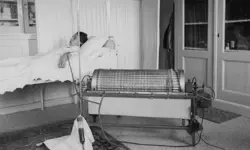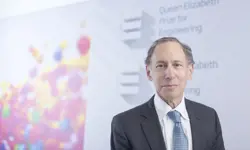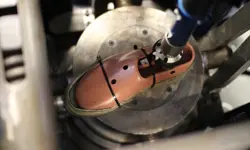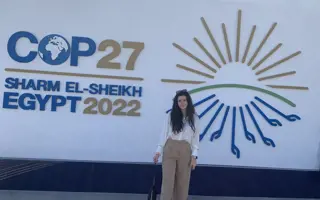
Q&A: Robert Hammond, biomedical engineer
Why did you become interested in science and engineering?
I don’t remember a time I wasn’t fascinated by science. As an eight-year-old I apparently proclaimed that I was going to grow up to be a biochemical engineer. I am now (arguably) a biomedical engineer, so I wasn’t far wrong.
My first strong memory of being captured by the idea of taking components and turning them into a usable machine was in a Lego kit, to produce a car that had a working gearbox. That was where my first basic understanding of how gearboxes and engines came from. [With] the object I'd created, having taken basic components – simple plastic bricks – and turned it into something that could change gears, you could see the pistons moving in the engine... It was really, really exciting and interesting, and then that carried on right through to a love of fairly basic robotics when I was in my teens.
How did you get to where you are now?
Hard work and lots of help! I wouldn’t have achieved what I have so far without the assistance of my friends, family and academic support network who have always championed my efforts and helped me on my way.
I chose my PhD studies based on the exciting combination of microbiology and robotics. The PhD I originally interviewed for at St Andrews was not the one I ended up getting – I was called in to interview for something about mycoplasma, which are interesting in and of themselves. But there was another potential supervisor in the room, who said that this had turned out to be a dual interview as I had said some things of interest to him, and would I like to work on electronics, electronic engineering and robotics, in and among microbiology (which I had a master’s in). I said yes, that sounds very exciting, having always being interested in mechanical objects, engineering and robotics.
So, we started a project together, but the supervisor shortly thereafter left the university and I was what gets called an ‘orphan PhD student’ – sort of left without a supervisor. But I did have a second supervisor who is Professor Stephen Gillespie, who sort of picked me up and became my primary supervisor. At this point, I had already created an object, the detector, which the company would later be formed around. So while that initial project didn’t work out, I moved sideways to another where I found a love of diagnostics.
What has been your biggest achievement to date?
Spinning out a company now worth over $35 million was pretty cool! The awards that we’ve achieved for the technology we have developed are also excellent. That said, I believe in achievements every day, helping colleagues with their problems and coming home to my family each day is a big achievement in my book.
What is your favourite thing about being an engineer?
The opportunity to be the first to see something, to know something or to understand an idea or principle for the first time is what gets me out of bed in the morning. Combining that with a love of building things and designing instruments that previously didn’t exist to answer questions that were previously unanswerable makes the combination of science and engineering one I will never be able to put down.
What does a typical day involve for you?
It starts at 6am, woken by my two boys, who are both under three. Leave the house and drive, cycle or ride the bus to work. Answer emails, speak to my team, catch up on the latest data. Speak to undergrads, lecture, maybe make it to the lab myself to conduct an experiment or two and then home. Rinse and repeat.
Quick-fire questions
Age:
35
Qualifications:
BSc(Hons), MRes, PhD
Biggest engineering inspiration:
Person – Isambard Kingdom Brunel. Edifice– Panama Canal
Most used technology:
Does anyone not say ‘smartphone’?!
Three words that describe me:
Hardworking, excitable, curious
What would be your advice to young people looking to pursue a career in engineering?
As I alluded to above – hard work is definitely part of the equation. You don’t need to know what you are going to work as at age eight but having a goal in mind and sticking to it no matter what the world throws at you is critical. It’s not easy but it can be done with determination that borders on stubbornness. The other aspect I alluded to is help. Lean on dependable people or you won’t make it. In a professional space try to weave what my mentor calls a “web of mutual self-interest” – make sure you buddy up to people who can help you and that you can help, the latter is just as important as the former.
What’s next for you?
Onwards and upwards!
***
A 2022 winner of the RAEng Engineers’ Trust Young Engineer of the Year Award, Robert is a Lecturer in Infection and Global Health at the University of St Andrews.
Contributors
Keep up-to-date with Ingenia for free
SubscribeRelated content
Health & medical

A gamechanger in retinal scanning
2006 MacRobert Award winner Optos rapidly became a leading medical technology company and its scanners have taken millions of retinal images worldwide. There is even a display at the Science Museum featuring the Optos development. Alastair Atkinson, of the award-winning team, describes the personal tragedy that was the trigger for the creation of Optos.

Kidney dialysis
Small haemodialysis machines have been developed that will allow more people to treat themselves at home. The SC+ system that has been developed is lighter, smaller and easier to use than existing machines.

Engineering polymath wins major award
The 2015 Queen Elizabeth Prize for Engineering has been awarded to the ground-breaking chemical engineer Dr Robert Langer FREng for his revolutionary advances and leadership in engineering at the interface between chemistry and medicine.

Blast mitigation and injury treatment
The Royal British Legion Centre for Blast Injury Studies is a world-renowned research facility based at Imperial College London. Its director, Professor Anthony Bull FREng, explains how a multidisciplinary team is helping protect, treat and rehabilitate people who are exposed to explosive forces.
Other content from Ingenia
Quick read

- Environment & sustainability
- Opinion
A young engineer’s perspective on the good, the bad and the ugly of COP27

- Environment & sustainability
- Issue 95
How do we pay for net zero technologies?
Quick read

- Transport
- Mechanical
- How I got here
Electrifying trains and STEMAZING outreach

- Civil & structural
- Environment & sustainability
- Issue 95